#THE SONG STRUCTURE!!!
Note
Hey hello. Consider. Hobie reading over and suggesting edits to drafts of Peter's writing and then going home visually with clippings and quotes from said writing as a part of him. Alternately, Peter takes inspiration from quotes visible on Hobie
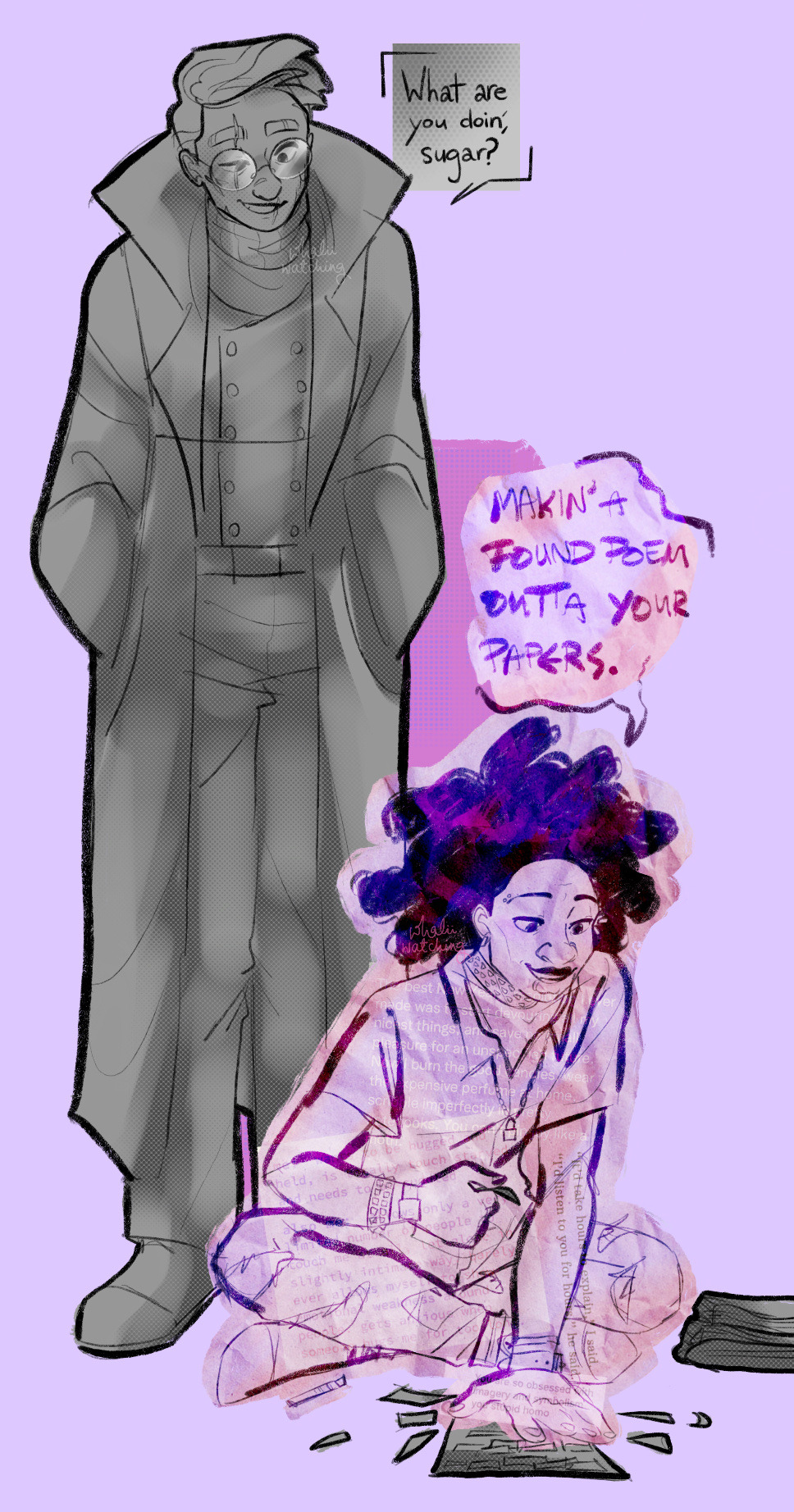
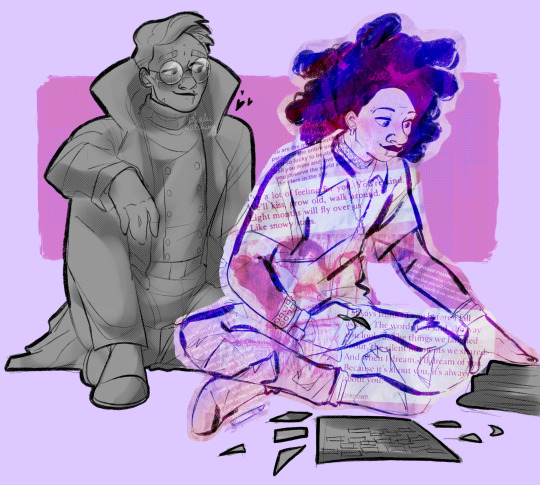
heart on your sleeve…..
#spider man: across the spider verse#spider punk#spider noir#hobie brown#noirpunk#noirpunk discord was chatting abt words on hobie’s university signature reflecting his thoughts which i’ve done before lol#hobie gives me the opportunity to be obnoxious abt poetry <333#oh how i love them#thank you anon!!! i rlly appreciate people leaving lil ideas in my inbox#even if it takes a while for me to figure out how they’ll work#but it’s so much fun and it’s so sweet and i’m so glad people think of me to share their ideas!!#they’re both writers except parker usually sticks with prose#and hobie with song lyrics so i believe in my heart of hearts#that they are both SHIT at poetry#(yeah song lyrics are poetry but the structure/vibe is way different lol)#poetry is something they almost unconsciously start to practice together/for each other#type of nerds to be like ‘aw this is such a sweet love poem… you spelled this wrong and repeated this phrase already—‘
504 notes
·
View notes
Text
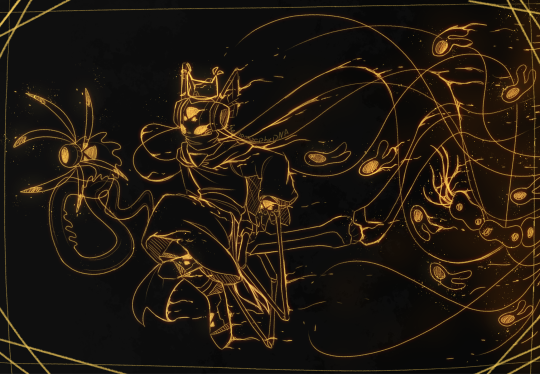
This is an on the string propaganda post
Brought to you, by me (with love)
It's time for machine comforts. Comforts we can't understand, or experience. Let them be happy, let them be at peace with their body.
Does a breath of cool water feel nice on their systems? When it's quiet do they listen to their own heart and feel the electricity pulsing? Does it remind them that they are alive and a part of this world? Do they have dreams? Hopes and projects they wish to work on, hobbies?
Why get off the string into the harsh and deadly world, fighting for survival and losing everything they've ever known to love about themselves?
What about the safety of their bodies? How scary would it be for a machine with thousands, maybe millions of throughs to suddenly have just a handful. The horror of everything going silent.
They have hundreds of eyes to see the world for all its beauty, they capture moments that would otherwise go unseen. Why blind themselves of such things?
#they are alive with ALL of themselves#people make puppets way too important. can we spare some love for the giant box in the recursive transfrom array?#can we give a little love to the neuron flies that dance and carry the thoughts of the iterator#and the memory conflux...they'd never forget anything..not your birthday or your favourite colour or the things you care about#the general system bus playing a song.. something unique just to them.. you can sit and listen to them think#and overseers that you can always show your art to..and they can do a lil spin and display a heart to show the appreciation#Could you lay on the ground on top of an iterator and feel the hum of the structure? could you watch the stars together?#and even after the ancients are gone could they light up rooms and make patterns of glowing windows on the side of the buildings?#really big machines can be happy being really big machines#let them have their comforts and joys we could never understand#love iterators <3 so fascinating#rain world#iterator#rain world oc#iterator oc#oc veil of dreams#drawins
207 notes
·
View notes
Note
I keep on telling people you're the only one who knows how to plot. Can you teach all of us how to plot, please? I love you.
I AM SUMMONED? PLOT BRAIN SUMMONED?
I love plotting. It's my favorite part of the writing process. Plot is "things that happen" and the best part of writing is imagining things that happen. I'm going to assume that whoever may be reading this knows how to imagine The Happenings, so I'm gonna be talking more about structure, but in like, a kinda abstract sense.
A good plot is a little bit more than a string of events. Plot is like music: there's variation in rhythm and sound and melody, but ultimately there's cohesion, because it's all one song. You can have a bunch of wild things happening, but no matter how strange, there should be something that links them all together, because you're telling one story.
Plot structures are patterns in stories. I'm pretty sure most of them were developed as analysis tools (as in, story already exists > look! it follows this pattern) rather than as writing tools, but people use them as writing tools because it's a neat little way to organize the chaos that is "shit happens." Stories follow patterns for the same reasons music follows patterns: we enjoy the certainty of hitting certain beats. But we also like being surprised. A good pop song doesn't sound like a random collection of sounds, but it also doesn't sound like the middle slider of other songs.
There is this shared concept in both music and writing: the idea of tension and release. Basically, you're playing with reader expectation: there's an imbalance in the experience (tension), and we want to see that imbalance resolved (release). All the common plot structures deal with this basic pattern:
You set an expectation
There are complications to the expectation
You meet the expectation
And this rhythm is happening on multiple levels in writing. Scenes follow this structure (we're gonna get past that door, we're gonna find the murder weapon, we're gonna collaborate and come up with a plan) and all those scenes feed into the overarching expectation (we're gonna solve this murder!). I usually think of chapters as their own mini-story, part of the larger whole. And I think of scenes as their own mini-story, part of the larger chapter. I have engineer brain. I see the gears spinning in the clock. That's why all my chapters have at least One Important Thing happening, because that's that particular chapter's Step #3.
And One Last Important Thing:
In music, a delayed resolution is almost always more interesting than the standard resolution. In writing, that means you wanna drag out Step #2 for as long as you can. That's where the bulk of the story is happening, that's how you build tension, that's how you get people to turn the page.
So when you write a fake dating fic, those bitches better not get together until the very end. I came here for fake dating, not for real dating, damn it. If you resolve that expectation early on, you better replace it with a different expectation that's just as engaging.
But also don't drag it out for too long. Sorry. The hard part of writing is learning the difference between too short and too long. Writing is unfortunately a nuanced skill which is why my advice is like "do this but not too much teehee." But tension and resolution is just rhythm, you can build a sense for it if you engage with enough stories.
#asks#yellowocaballero#writing#writing advice#THANKS FOR ASKING ME THIS MEG I LOVE PLOT I WILL TALK ABOUT HER ALL DAY AND I LOVE YOU TOO#i haven't read a fake dating fic in a long time i just brought it up because it was the first Trope Thing that came to mind#i didn't go into different plot structures because i was trying to boil them all down into the very basic building block of question-answer#but if anyone's curious i usually favor a circular plot structure#the ending reflects the beginning. the song loops: the same beats but with new perspective. cycles.#and by that i mean 'story starts with dink being mean to time' and 'story ends with dink being mean to time (but now it's affectionate)#lazuli talks
174 notes
·
View notes
Text
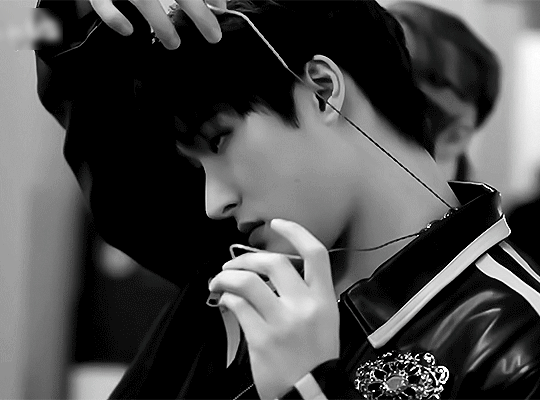
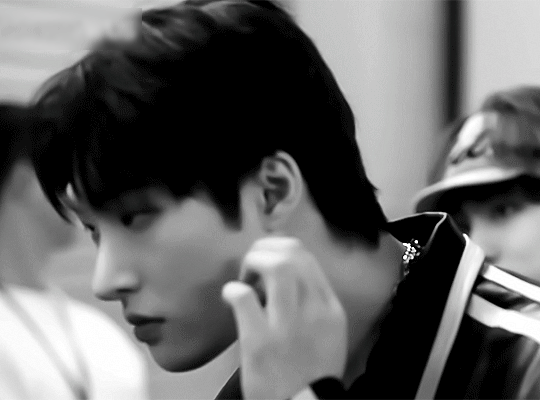
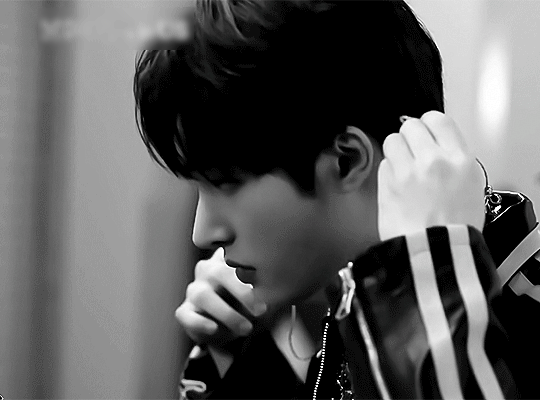
#anyways hand kink#mingi#song mingi#ateez#ateez gif#mingi gif#maxsixgif#he has a nice nose too actually#wth is with this group and their really exceptional bone structures
116 notes
·
View notes
Text
you think pete wentz is a bad lyricist? should we throw a party?? should we invite gerard way???
#idgaf about the cover and you sound ridiculous if you're using the lyrics from the cover of a ridiculously structured song to try and#argue your point you sound stupid#anywayyyyyyy
204 notes
·
View notes
Text
Screaming from the crypt (or how the past haunts the present on Midnights)
I know it's been discussed so much since Midnights came out but just.
I love how there is such a clear narrative throughout the album (and perhaps especially on the 3am/Vault tracks). About questioning and regret and choices and coming to terms with all of it. It is one long story about how we're all a mosaic of the choices we make, each one taking something from us and leaving something else in its place.
(And now a disclaimer: I'm looking at this mostly through a narrator/subject lens, and trying not to dive too deeply into real-life events or speculation except for in a general sense. For this purpose I like to look at the body of work as art, like literature, because I find it makes it easier to see the common threads in the different songs and cohesion in the narrative.)
In looking at the 3am+ tracks in particular, it's fascinating how some turns of phrases or themes repeat themselves in different songs, in different contexts. (I'm only focusing on the non-standard tracks because there are too many songs and I'd be here all day but I bet I could do a part two lol.) I know many people have pointed out the parallels throughout her discography already and I’m not saying anything groundbreaking by writing this, but I love how these parallels run through in the same album, because it makes it seem like it's one long story, or at least, one long rumination on many different stories that are coalescing into a single narrative.
Battle (let’s go)
For instance, the one that jumped out at me when I started writing this post the other week was, "Tore your banners down, took the battle underground," in The Great War and "If clarity's in death, then why won't this die? Years of tearing down our banners, you and I," in Would've, Could've Should've. It's a story about staying stuck in the same cycle of reliving trauma and coping mechanisms and bad habits over and over again and fantasizing about how taking the “antagonist” out and gaining the upper hand for good would bring closure (WCS), but the truth is that nothing ever will. All that cycle does, though, is repeat itself in other situations, and in this case pushes someone away the narrator cares for (TGW). The difference is that the imagined battle in WCS is a two-way street in her mind (that is ultimately unwinnable because it was never a fair fight), but in TGW it's one-sided -- she's the one fighting dirty, taking shots, the way she'd been doing in her imagination (or nightmares) all these years. But the person in front of her isn't fighting back the way the person in her mind in WCS would, because their intentions are honourable instead of exploitative.
And that's paralleled in another pair of lyrics from the two songs, "And maybe it's the past talking, screaming from the crypt, telling me to punish you for things you never did," (in TGW) and "The tomb won't close, I fight with you in my sleep," (in WCS). In both cases, the funeral imagery makes it seem like this past event should be dead and buried in WCS, but it keeps rising from the dead, haunting her no matter what she does and in TGW, another (or perhaps the same?) tomb that won't close keeps unleashing new ways to hurt her and in turn the new person in her life. In other words, the trauma from the past continues to bleed into the present.
(Again from a literary point of view, I'm not saying the events of the two songs are linked IRL, but they're fascinating textual parallels on the album as a string of chapters, which is why Dear Reader is so compelling, but that's a whole other essay.)
To keep the battle motif going, there’s yet another parallel, this time between TGW’s "[You were a] soldier down on that icy ground, looked up at me with honor and truth," and You’re Losing Me’s "All I did was bleed as I tried to be the bravest soldier, fighting in only your army.” In the former, the subject is laying down his armour in the war she’s projecting onto him, waving the white flag, and she realizes that she’s about to destroy something if she doesn’t put her sword down too. By the time we get to YLM, the roles are almost reversed; at the very least they’re supposed to be on the same team, but in this case she’s doing all the heavy lifting, fighting for their relationship in contrast to his apathy killing it. It’s also pretty interesting (if not outright intentional) that one of the 3am+ editions of the albums starts with The Great War, where they find themselves in conflict (even if it’s in her head) that ends in a truce, and ends with You’re Losing Me signalling the end of the relationship, evidence that the resolution in the first song wasn’t an ending but merely a ceasefire before the last battle.
Putting the rest under a cut because this is waaaaay too long now ⤵️
(There’s also another metaphor there in The Great War with its battle imagery: World War I, aka The Great War, was supposed to be the war to end all wars, because loss on its scale was never seen before and when it ended, most thought never again would the world embroil itself in such battle, the horrors and implications were so devastating. Two decades later, the world found itself in WWII, with an even larger scope and more horrific consequences, the intervening time between the two a period of festering conflicts and resentment leading to some of the worst acts the world would see. Bringing real life into it for a second, there’s something a little poetic, though sad, about The Great War the song being about a fight that could have ended the relationship that they ultimately resolved and was meant to be evidence of the strength of their love, but so too did it end up being a period of détente, the greater battle coming for them years later. But that is not the point of this post.)
If one thing had been different
Another major theme in these editions is pondering the "what ifs?" of life, but I think it takes on even more significance in the broader context of the album in the lyrics of "I'm never gonna meet what could've been, would've been, should've been you," in Bigger than the Whole Sky and the repetition of would've/could've in Would've, Could've, Should've (I would've looked away at the first glance, I would've stayed on my knees, I would've gone along with the righteous, I could've gone on as I was, would've could've should've if I'd only played it safe, etc.) In both songs, the narrator is mourning an alternate course their life could have taken* and questioning what they could have done differently, in the aftermath of trauma and loss, and the regret that comes with that loss, and with the loss of agency in the situation because ultimately it was never in their hands. In an album full of questions, wondering about the path not taken, or the forks in the road that have led to a different version of your life, it's digging deeper into the contrast of choice vs. fate, action vs. reaction, dwelling on the past vs. moving on. When you're supposed to let go of the past, what do you do when it is holding your future hostage?
(*I know there are different interpretations/speculation about BTTWS which I am not getting into on main. I'm just saying that whatever the song is about, it's grieving something that never came to be. The literal origin of the song is less important to the album than the sense of loss it portrays. Whatever the inspiration is, it's crafted to tell part of the story of Midnights of ruminating over how, to borrow from her previous work, if one thing had been different, would everything be different?)
(Also I was today years old when I realized that the words are inverted in the two songs. Apparently I've been hearing BTTWS wrong this whole time.)
There's also an interesting tangent in the role of faith in both songs: in WCS, the events of the story cause her to lose her faith (e.g. "All I used to do was pray," "you're a crisis of my faith,") and question all the things she felt had been unquestionable until that point in her life (e.g. "I could have gone along with the righteous"), whereas in BTTWS, she questions whether that very lack of faith is to blame for the loss in that song ("did some force take you because I didn't pray? [...] It's not meant to be, so I'll say words I don't believe"). It's like pinpointing the moment her life changed and upended her beliefs (WCS), but as a result then leaving her unmoored in times of crisis because ultimately there's no explanation or comfort to be taken from what she used to hold true before that (BTTWS). The words she once relied upon to guide her have long since lost their meaning, but in times of trouble it leaves her wondering if that faith she once held then lost could have prevented this pain.
(Shoutout to WCS for being Catholic guilt personified lol.)
To keep on with the vaguely faith-y notions, an obvious parallel is the line in Would’ve Could’ve Should’ve about, “I damn sure never would've danced with the devil at nineteen,” and, "When you aim at the devil, make sure you don't miss," in Dear Reader. All of WCS is about her fighting with an antagonist who haunts her, with whom she wholly regrets ever becoming involved. DR could be seen as a reflection on that fall from grace, warning the audience that if you choose to go after the person (or thing) haunting you, make sure you do so clearheaded enough to be decisive. Again, these “devils” may not be related in real life: the IRL devil in DR could be speaking about her naysayers, or Kim*ye, or Scott & Scooter B, etc., meaning not to cross your enemies until you know you can win. But taking real life out of it and looking at it textually, I am intrigued by the link between WCS and DR, so that’s what I’m going with here. And perhaps that’s even the point in a wider sense; there will be multiple “devils” in your life, or threats to your well-being. If you’re going to commit to taking them down — whether it’s an actual person, or the demons inside you that refuse to let you go — make sure you have the right ammo so that they can no longer hurt you. (Of course, one lesson from these experiences is that sometimes you can’t win, and you have to live with the fallout.)
(Sidebar: I know that “dancing with the devil” is a turn of phrase that means being led into temptation and engaging in risky behaviour, as opposed to describing the actual person. Given the religious metaphors in the song, that could very well be/is the intention, particularly when it’s preceded by, “I would have stayed on my knees” as in she would have continued to follow her faith — in whatever sense that means — had she never met this person, which could also be a more eloquent way of saying she would have continued to be live her life in a way that was righteous (even naive) and seen the world in black and white. Either way, it’s a force she wholly rejects. Like I said, multiple devils, same fight.)
Regret comes up too: in WCS, she says, "I regret you all the time," obviously directed at the person who manipulated her and led to her perceived downfall, citing him as the one impulse she wished she'd never followed, because it won't leave her no matter how hard she’s tried. In High Infidelity, she tells the person to, "put on your records and regret me," and on the surface, it’s like she’s turning the tables, painting herself as the one now causing the regret in someone else, the one inflicting the pain this time. Yet the verse preceding it and the lines following it in the chorus depict a partner who is also emotionally manipulative and vindictive like in WCS (“you said I was freeloading, I didn’t know you were keeping count,” “put on your headphones and burn my city,”). It’s not so much that she’s intentionally harming the person (the way the person in WCS does to her), but rather that the venom in the subject’s feelings towards her seeps through; she’s imagining the way he’s going to feel about her when she leaves, hating her just for by being who she is. (There could be another tangent about how in both songs she’s there to be a “token” in a game for both of the men, who play her for their own purposes.) The regret is dripping with disdain. It’s as though she’s picturing how the person is going to hate her for doing what she’s thinking of doing the way she hates the person who first hurt her.
Sadness, unsurprisingly, shows up in a few lyrics. In BTTWS, “Everything I touch becomes sick with sadness,” sets the scene of a person so overcome with grief that it permeates everything around them; they cannot see their way out of it and feel like the fog will never lift. In Hits Different, it’s, “My sadness is contagious,” the result of a breakup where the person’s grief again touches everything and everyone around them, pushing them further in their despair and loneliness. The reason behind the grief in either case may vary, but regardless of the source, the feeling is overpowering and isolating. They may be different chapters in the story, but the devastation is hauntingly familiar. (As is a recurring theme in Midnights as a whole: there are situations and feelings that present themselves at different points in her journey and colour in the lines in different ways along the road. Like revisiting an old vice and realizing the hit isn’t quite the same as it was in the past.)
Death by a thousand cuts
She also writes about wounds on this album, which isn't surprising I suppose given that the whole conceit is that these are things that have kept her up at night over the years. WCS is perhaps the driving narrative on this never ending hurt when she sings, “The wound won't close, I keep on waiting for a sign, I regret you all the time,” suggesting that no matter what she does, the pain of this experience has permeated everything she’s done afterwards. (Not unlike the overwhelming grief in BTTWS, for instance.) Elsewhere, in High Infidelity she sings, "Lock broken, slur spoken, wound open, game token," and in Hits Different, "Make it make some sense why the wound is still bleeding.” Again I'm not suggesting they're about the same events; the line in HI is about a situation where a partner crosses a boundary, hits below the belt, picks at an insecurity (or creates a new one) and treats the relationship like it's transactional, opening the floodgates in turn. In HD, the wound seems to be more self-inflicted, where she's pushed the person away. (Over a situation real or imagined she feels she needs distance from.) But again, something has picked at her like a raw nerve, and just like in the past, she's hurting, even in a different time and place and person. Almost like the wounds of the past break open over and over again to create new scars. If one were to extrapolate further, it wouldn’t be the biggest leap to wonder if the wound open in WCS, then torn apart in HI makes the one in HD hurt even more.
(I once wrote a post about how I think as time goes on, WCS is going to turn into one of those songs that will be found to drive so much of her work, because it’s just… kind of the unsaid thesis statement of so much of her songwriting.)
Another repeated theme is that of the empty home and loneliness. In High Infidelity, she sings, "At the house lonely, good money I'd pay if you just know me, seemed like the right thing at the time," painting a picture of someone who may have everything they'd want to the outside world, but in reality feels metaphorically trapped in their home (or at least alone amidst abundance), a symbol of a relationship gone sour and a failure to build connection. She just wants someone to understand her, want her for her, but as she's written earlier in the song, she's just a pawn in the game, a trophy from the hunt. Home, in this case, is lonely, isolated, an emblem of her fears. In Dear Reader, she continues this thread, then singing, "You wouldn't take my word for it if you knew who was talking, if you knew where I was walking, to a house not a home, all alone 'cause nobody's there, where I pace in my pen and my friends found friends who care, no one sees you lose when you're playing solitaire." It's the same idea, admitting to listeners that the gilded cage she lived in kept her distanced from her loved ones and real connection, keeping her struggles close to the vest but feeling desperately lonely amidst her crowning success. She's pushed people away and it may have felt like the right thing at the time, but in the end maybe felt like she was trapped. And when you push people away, eventually they take you at your word and stop pushing back; you’re a victim of your own success at isolating yourself. What starts out of self-preservation then further perpetuates the underlying problems.
(There's another interesting link about "home" also feeling unsafe with HI's "Your picket fence is sharp as knives," which further leads into the theme of marriage/domesticity feeling dangerous, which is a whole other thing I won't get into here because it's another discussion and may derail this already gargantuan word salad.)
In a slightly similar vein, we have the metaphor of bad weather for a rocky road or unstable relationship, in High Infidelity again with, "Storm coming, good husband, bad omen, dragged my feet right down the aisle" and You’re Losing Me’s "every morning I glared at you with storms in my eyes.” They aren’t speaking of the same situation or even same kind of breakdown, but it is pretty interesting how the idea of clouds/storms/floods/etc. play such a role in Taylor’s music to signal depression, apprehension, fear, uncertainty, etc. In HI, I think the “storm” coming is the looming threat of commitment to a partner who makes the narrator uneasy (if not fearful). In this case, the idea of making a life with this person is not one that incites joy or comfort, but instead makes the narrator feel that dark times are ahead if she continues down this path. Perhaps in some way, the “storms” in YLM have made good on the threat in HI in a different way; it’s a different home, a different relationship, but the clouds have settled in regardless, and some of her fears have come to fruition in ways she did not expect. The person she once trusted no longer sees her or her struggles (or worse, doesn’t care), and the resentment and pain build with each passing day.
Coming back to heartbreak, one of the obvious "full circle" moments is the beginning of a relationship in Paris, where she says that, "I'm so in love that I might stop breathing," clearly enthralled in a new love that allows her to shut the world out and grow in private, capturing the all-encompassing nature of the relationship. This infatuation has consumed her in the most wonderful way (in contrast to the sorrow of some of the previous songs), and it feels like a life-altering (or even life-sustaining?) force that is so strong she may forget what it’s like to breathe. (Metaphorically speaking, of course.) By the end of the album, though, in You're Losing Me, that heart-stopping love has become a threat: "my heart won't start anymore for you." In the former, her racing heart is full of excitement, but by the latter, her heart has given out completely under the weight of the pain she bears. (YLM is full of death/illness imagery which I already wrote about awhile ago so I won't hear, but needless to say that song deserves its own essay for so many reasons.) She's gone from the unbridled joy of the beginnings of a relationship to the unrelenting sorrow of its end, two sides of the same coin.
Love as death appears elsewhere in the music too, for instance, in High Infidelity’s, “You know there's many different ways that you can kill the one you love, the slowest way is never loving them enough" and You’re Losing Me’s “How can you say that you love someone you can't tell is dying? […] My face was gray, but you wouldn't admit that we were sick.” Though not completely analogous situations, they both tell the tale of one partner’s apathy (or at least denial) destroying the other. In the former, the partner’s actions (or inaction) are more insidious, if not sinister; in the latter, the lack of momentum (or admission of a problem) is passive. In both cases, the end result is the narrator’s demise; it’s a drawn out affair that chips away at her morale and her health and her sense of self. (Breaking my own rule about bringing in alleged actual events into the discussion, but the idea that the relationship in High Infidelity, which was obviously fraught with unease and even fear, ended in a similarly excruciatingly slow and hurtful death by a thousand cuts as the relationship in You’re Losing Me almost did at that time must have been so painful. It almost feels like YLM is wondering why what used to be a source of light in her life was mirroring a situation that caused her such pain in the past.)
From the same little breaks in your soul
I said early on that part of what is so compelling about Midnights is that it feels like an album about ruminating — on choices, on events, on people — and the two final “bonus” tracks of the album depict that as well. In Hits Different, she sings that, “they say if it’s right, you know,” an ode to the confusion of a breakup and struggling with the aftermath of calling it quits. It’s a line that has always intrigued me, because the typical use of the phrase is in the sense of, “you’ll know when you meet the one,” but here it seems to have a double meaning, a reassurance perhaps from the friends (who later on tell her that "love is a lie") that she’ll know if she’s made the right decision in calling it off, but could also be her wondering if the relationship is right, she’ll know, and want to reconcile. In the final bonus track, You’re Losing Me, she sings, “now I just sit in the dark and wonder if it’s time,” this time leaving no doubt about the dilemma she faces, though it’s no less fraught. She’s wondering, perhaps for the last time, if now is finally the moment to end the relationship for good. They say that if it’s right she’ll know, and now she’s wondering if that feeling inside her (that once told her her partner was the one, which is why it hit differently), is telling her that it’s time to go for good. Wait Alexa play “It’s Time To Go.” These are not only the things that keep her up at night, but the things that play over in her mind like a film reel in her waking hours.
Midnights as a whole is a deeply personal album, as is most of Taylor's work, but the 3am+ edition tracks seem to dig even deeper to a lot of the issues raised on the standard album. Almost like the standard tracks are the things she wonders about on sleepless nights, but the bonus tracks are the things that haunt her in the aftermath. The regret, anger, sadness, grief, relief, even joy— they’re the price she pays for the memories she keeps reliving. Midnights might be the most cohesive narrative of all her albums, and really does feel like we’re watching someone work through her journal over time, stopping short of outright naming those giant fears and intrusive thoughts (except for when she does) but making them plain as day when you connect the songs together, and perhaps never more clearly than in the expanded album. It’s incredible how the songs stand on their own to relay a specific moment in time, but that they are also self-referential to each other (whether thematically or overtly) to weave a larger web over the entire work. We’re so lucky as fans to have these stories and to keep peeling back these layers as time passes. (And my literature-analysis-loving ass loves her even more for it.)
This is obviously by no means an exhaustive list, and I know there are more parallels and probably even stronger links (particularly when you add the standard version into the mix), but these were the ones that particularly struck me and I’m just glad I’ve had a chance to sit with this and think it through. ❤️
#writing letters addressed to the fire#me thinking too hard about taylor lyrics#taylor swift#midnights#long post#lyrics analysis#song parallels#Gabby this one is for you friend <3#here goes nothing#Happy Friday or something idk!#(also i know i said there are things i wouldn’t discuss on main but my dms are open lol)#this is not as structured or well plotted out as I wanted it to be#and turned out to be more stream of consciousness than legit essay#but whatever at least i got my thoughts out there and it can release some plot of land in my brain for other stuff to think over lol#If anyone ever reads this thank you! And I’m sorry?#The best compliment i ever got in school#was when we were doing an analysis of a poem in English lit in college#And i brought something up casually#and my prof went ‘I’ve been teaching this class for eight years and that’s the first time anyone’s ever brought it up like that’#’and that just blew my mind’#and i was like ‘who me?’#so that’s all you need to know about me lol#Midnights: The Great War#Bigger than the whole sky#bttws#Midnights: Paris#Midnights: high infidelity#would’ve could’ve should’ve#Midnights: dear reader#midnights: bigger than the whole sky
70 notes
·
View notes
Note
I've always found Alexander Saburov interesting, especially P1 Rubin's take on him where he tells how Alexander in incognito saved people from burning house and went unrecognized for the deed (nor flaunted it). Wonderful and easy to miss characterization.
YES saburov's fucked up sense of performing duty by putting himself at risk... my favorite... have had thoughts brewing in response to this that aren't quite cooked enough yet but it's very much a gendered standard that he holds himself to IMO, of idealized masculinity as a responsibility. as an active role and as the way things must be done. making the choices that he thinks need to be made regardless of how bad they are for him. pairing beautifully with katerina's self-destructive attempts to conform to the extremely feminine-gendered role of mistress, pairing wonderfully with the two of them's catastrophic attempt to conform to the heteropatriarchal nuclear family archetype by adopting the changeling :^) and especially how this is a function of how saburov relates to his Job, a role that's been passed down in his family and Actually Is critical to the function of the Town, inescapably so as long as the system of rulers exists
#it Is a little funny to me that p1 showed this family structure being flawed so extensively (with all three rulers!) and now p2 is a You#Must Get A Wife And Kids Then Everything Will Be Fine simulator (...more or less w/ all three rulers but mostly re: the player).#alexander saburov#asks#anonymous#also stream ee's song Big Climb. I have no idea how it wasn't previously on my ee exclusive saburovs playlist but it's very them#further: I do think gender is a factor in saburov's vitriol towards peter/the architects (in this view of masculinity as self-discipline#/moderation. They Don't Do It Like That) and I think that's a fun field to explore in several directions. and to contrast with rubin who ha#a similar outlook about his own gender ('perfect valor' etc.) but is an outcast and out of the spotlight in a gay coded way; whereas#alexander and his wife are under the utmost scrutiny wrt being held to Gendered Positions in the town AND are bound by duty and history to#uphold its traditions. like. saburov has no escape that could result in a healthier relationship with gender#and if you're a wise-minded saburovs t4t enjoyer... well... The Layers Only Deepen#pathologic
53 notes
·
View notes
Note
Not to be uhhhh annoying, but Karkat's theme and Eridan's theme from Alterniabound at the very least have to do with each other.
Both of them start off with a melody, but switch it up at around 0:06 seconds. Then once again another switch at 0:52 (almost perfectly in sync).
At around 1:06, Eridan's theme goes slow and sad, and on the other end? Sounds of tediousness(TM). Barking, Super Mario ghost oooohing that sounds like rolling your eyes, and vaguely digital soundbites.
And THEN, at around 1:23, Karkat's waltz resumes, and Eridan's theme also becomes a waltz (more or less at 1.25x Karkat's speed).
Karkat's music ends at 1:57, WOULDN'T YOU KNOW IT Eridan's theme kicks up. And then a "Hey!" is heard at 2:03/2:04, a couple of seconds after Karkat's theme actually ends.
Quite literally: "Karkat pay attention to me. Hey. Karkat. Karkat. Karkat." lmao.
And guess which theme also loosely follows this pattern? Terezi's. A canonical crush of Karkat's (A lot more out of sync, though). Kanaya's theme doesn't, however. Much less Vriska's, or any other theme in Alterniabound's album.
Of course all of these songs follow a pattern, and they're made for the same [S] Pages. Karkat and Eridan's, though? Almost completely in sync.
I dunno, maybe I'm trying to fit triangles into square holes, but it seemed worth mentioning. I genuinely tried listening to both at the same time in two different tabs but I couldn't get much out of it.
(This is nosyDetective btw, I just can't send asks from this blog bc it's not my main 😔)
Unfortunately, the similarities seem pretty superficial - eridan's theme is mostly in 4/4 (2/2 technically because its a march) and karkat's is in 3/4 the whole time - but still, here's the two 3/4 parts mashed together for your listening pleasure, hahah.
#eridan ampora#karkat vantas#homestuck#erikar#REALLY quick and dirty#i only changed the tempo of eridan's part#which is why it sounds so dogshit#i am not a sound engineer lol#they don't even really stay in the same key#eridan's jumps between major and minor in a way that clashes with karkat's pretty horribly#so only in song structure are they the same and it could be a coincidence#this is all i can do with my limited skillll it would take a more skilled sound engineer to join the two songs properly#esp. because again karkat stays in 3/4 the whole time and eridan switches to 4/4 for most of it
48 notes
·
View notes
Text
Looking at Wish, I just keep thinking of the people who called Frozen a 'lazy movie' because they used really similar face shapes for Anna, Elsa and their mother.
Look at the ice and snow effects in that movie. Listen to the music. Enjoy the comedy. Remember that it isn't even close to the beauty of Disney's best and yet it still remains a work of art.
Now look at Wish as the monkey's paw curls. Hey- at least they use different face shapes.
#the background and character designs are so simplified it could be a tv show on netflix#fitting to call it Wish when that's the name of a scam website that sells subpar products#the songs have no structure and sound like a 13 year old wrote them#the characters are annoying#nothing matters#the main conflict is a mess#the main character is just an entitled brat#it feels rushed and cheap#and then they have the NERVE to reference their classic movies as if this garbage is the same?#they think they can have the magic without the artists who made magic possible#disney branding does not make disney quality#it is an insult to reference snow white especially#from a monumental movie that pioneered animation to something too cheap and cowardly to even try?#and the budget on Wish SHOULD have allowed fot a great movie but where did it go?#This movie would be fine enough as an indie film#to attribute this as Disney is wrong#nothing about Disney is left
34 notes
·
View notes
Text
Tbh... I don't think TOH should get a pass for it's shoddy plot just because some of the stuff that happens within the plot invokes an emotional response in people.
First of all, people react to concepts with varying degrees of emotional intensity based on what they like and/or their life experiences. Secondly, you can still create resonate moments with a good plot lmao.
There is no reason TOH should get a pass for making Belos a non threat for most of Season 1 just because people think x, y, z moment is wholesome or whatever.
#toh critical#i really hate this weird trend where people think story structure should be disregarded just because they happened to like an idea#and i guess there is an argument to be had that we shouldn't care about story structure because most people aren't even#aware of it when they start reading or watching something. Like they left everything they learned in literature class after they#graduated high school or college.#but it's like... then why do ppl go online to read negative analyses of their favorite piece of literature or media lmao#because people who write analyses care about story structure and it's important to them. so.#oh right and you know. just because most people aren't aware of story structure doesn't mean you shouldn't write a good story#that's like saying ''well since people don't care about music theory that means I can make a song without using music theory'' like???#very bizarre tbh
39 notes
·
View notes
Text
what was the context for the line "so I messed up first, you messed up worse" in the DL song? it's such a funny line but I don't remember anyone talking about it
#double life#trafficblr#boat boys#ethoslab#<- it's his line#probably near the ship burning#given the structure of the song#what happened?#what did they do?
31 notes
·
View notes
Text
What do you guys think Dumpty Humpty would *actually* sound like? Obviously they're based on the big pop-punk/ scene of the time -the name, the designs, the massive in-universe appeal they have to EVERY teenager we see- so I think it's probably something between Linkin Park and early Fall Out Boy but with an egg theme... which makes no damn sense ...compels me though
#Dumpty Humpty#this is gonna be another instance where my love for musical structure and themes spirals me for a bit I bet#also fair warning this was only on my mind bc i was listening to my halloween rock playlist again and a tyler posey song came on#danny phantom
272 notes
·
View notes
Text
Who else out there is an autistic former-religious-zealot-turned-apostate and is just now figuring out that they didn't actually love the religion, they just loved the rituals associated with it
#i miss going to church every sunday and wednesday#i miss singing the same songs over and over#i miss having the exact same structure for services that never differed over the years#i miss getting together with large groups of like minded people#autism#apostate#ex fundie#ex fundamentalist#religious trauma#ex christian#no community has yet replaced the social role that church played in my life#i need structured environments to get to know people
25 notes
·
View notes
Text

#original poem#original poetry#poets of tumblr#poeticstories#poetsandwriters#poetry#writerssociety#writerscorner#writerscreed#writerscafe#spilled ink#original writing#heavily inspired by the rhythm(?)/structure of the song precious sight#but also heavily inspired by turning 25 soon... do with that what you will......
33 notes
·
View notes
Text

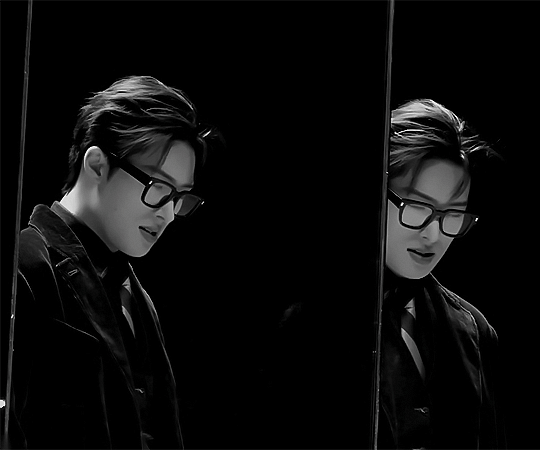
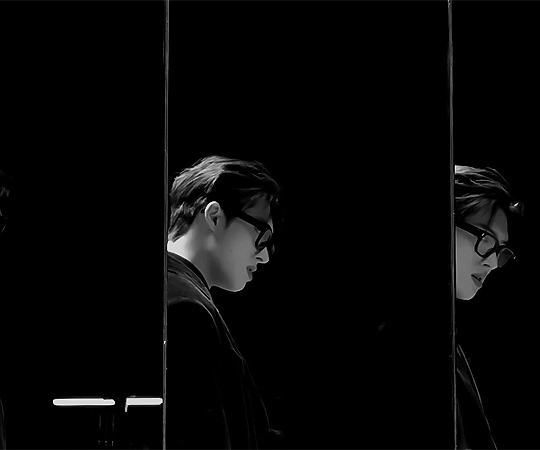
Fix On/Fix Off, Part Infinity
#i hope he knows that this whole part of the video really devastated me#song mingi#mingi#ateez#maxsixgif#mingi gif#ateez gif#this is why he is the first kpop boy i'd save in a fire#he has privileges#his facial structure is perfect to me#and his energy and vibes are perfect to me#in whatever flawed way it comes
29 notes
·
View notes
Note
Excuse me but why are you an artist? Not being mean but wondering why you do it? I will say the art is crazy good though amazing job!
I love character designing and world building! I love to make AUs and spinoffs, headcanons and redesigns, concepts and characters, and dont forget plots, (even if all of mine are ass)
When i was little i wanted to draw things in my brain which often was ocs or aus, aloot comes from when i listen to music and draw out the characters within sceneries id cook up :3
i think i do it too much bc there was a period in time where everytime id blink there would be a character concept id frantically try to jot down , some i have saved (you are ALL not ready for gutsy's 2019 oc babyboom)
#chopping#i think its why i like getting asks for my stuff/ocs#bc alot of their structure are from 1-4 minute long songs#un i have atleast#1383 ocs?#prolly more#prolly less but :3#i love them all! yes i have most if not all stored in folders/discord channels/toyhouse
12 notes
·
View notes